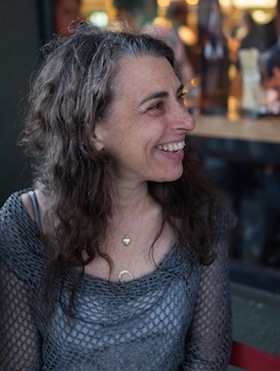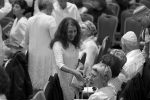Or Shalom’s Rabbi Hannah Dresner is both the first woman and the first Jewish Renewal rabbi to be elected head of the Rabbinical Association of Vancouver. (photo from Or Shalom)
“I grew up in a household of many amazingly powerful spirits,” Rabbi Hannah Dresner of Or Shalom Synagogue told the Independent. “My parents’ circle of friends loomed larger than life.”
Dresner has memories of playing ping-pong with Jesse Jackson, making paper dolls with Abraham Joshua Heschel and being read bedtime stories by Elie Wiesel. Her father, Samuel Dresner, was a rabbi and a renowned scholar of Chassidic thought. He was a close personal disciple of Heschel, who is widely regarded as one of the most important theologians and Jewish ethicists of the 20th century.
Dresner, herself an artist, dancer and academic for years before heeding the call to become a rabbi, walks softly and carries a big soul. Since coming to Vancouver to head Or Shalom after Rabbi Laura Duhan Kaplan stepped down from the pulpit to take on a role at the Vancouver School of Theology, Dresner has made waves by bringing a new range of creative programming to the shul. Events have included a dance troupe performing an interpretation of a Chassidic tale to live jazz music, a Shabbaton on Jewish wisdom about the afterlife, and guest Rabbi Benay Lappe teaching how to queer the Talmud.
Most recently, Dresner has again broken new ground in Vancouver, by being chosen head of the Rabbinical Association of Vancouver. She is both the first woman to hold the position and the first Jewish Renewal rabbi.
The Jewish Independent spoke to Dresner just days after she had convened her first meeting as chair. She said she was heartened to see that her election was a comfortable choice for the mainly male membership of the RAV – Rabbi Carey Brown is also a member – and an exciting opportunity for her to serve both her own shul community and the wider Vancouver Jewish community.
“I see this as a way for Or Shalom to be more visible as a legitimate part of the Jewish community of Vancouver, to bring our own sensibility to fostering kinship between rabbinic colleagues, and an opportunity for myself to serve the Jewish people,” she said.
So far, Dresner – who said she is very much still learning the ropes of the RAV – has innovated by introducing a session of group Torah study into the association’s meetings.

Dresner is known for combining traditionalism and progressive Judaism, including a commitment to “deep ecumenicism,” an openness to the wisdom not just of the different denominations of the Jewish community but the different religious traditions of humankind. This is what drew her to the Jewish Renewal movement founded by Reb Zalman Shachter-Shalomi. Renewal is known for its embrace of both traditional liturgy and observance and Torah study with feminist, ecological and ecumenical perspectives.
She said, “My job here [at Or Shalom] is to really nurture the historic members and create a space that is bold and fresh and open and willing to embrace our contemporary thoughts and needs, and to be truly inclusive; to nurture the old and to welcome and open as many portals as possible.”
Before becoming a rabbi, Dresner went to Barnard College to study dance and art then taught at the Ramaz School in New York. She went to graduate school at the University of Chicago and got her master’s in fine arts, becoming an exhibiting painter at a blue-chip gallery, with a career as a working artist while teaching in MFA programs. Her longest tenure was at Northwestern University for 10 years, where she was tasked with inventing new undergraduate courses across the arts.
When Dresner got married and had children, she felt the need for a prayer space tolerant of young mothers, a community in which to raise kids. She founded the Lomdim Chavura, which some quipped stood for “lean, mean davening machine.” The group met on Shabbat mornings and co-parented – they “birthed each other’s babies into life, and doula’d community members into death as well,” said Dresner.
“It was spiritual improvisation,” she said, noting that the chavura regularly gathered to experiment with new forms of expression. It was within that space that Dresner became interested in leadership and discovered davening and ritual as new spaces for her creative expression. She began seeing Jewish communal life as another way of being an artist in the world.
“Everything was woven together in our communal life,” said Dresner. “We made sukkot out of gourds or sunflowers. Ritual life was part of gardening, was part of cooking, was part of life and dance and art.”
Dresner said her discovery of the seamlessness of those things made her transition into the rabbinate very natural. “It is about translating those family expressions into a larger family,” she said.
Dresner had begun studying Chassidic texts while still an MFA advisor, to feed her soul and connect again with the spiritual milieu of her childhood. “We used to study the Sefer Ba’al Shem Tov every Shabbat afternoon,” Dresner said of her early childhood immersion, “and we sang niggunim until dark and then made Havdalah.”
Dresner’s study of Chassidus gradually blossomed into studying for the rabbanut. “I’m not really in rabbinical school,” she told herself. “I’m just taking these classes.”
Dresner was eventually ordained as both a rabbi and mashpia ruchanit (spiritual counselor). She has been two different kinds of CLAL fellow, in the Rabbis without Borders and Clergy Leadership Incubator programs.
During her rabbinic studies, Dresner was close with Daniel Siegel, the founding rabbi of Or Shalom, and she was excited when a job opening arose at the synagogue. “Coming here to the congregation that he founded had a lot of meaning to me and I had a lot of respect for Laura, the previous rabbi, as an intellectual as well,” said Dresner.
In 2001, Dresner had gone to Berkeley with husband Dr. Ross Andelman to focus on integrating their families. They made a deal: she had left her dream job and moved for him, and he would repay the favour after the kids had graduated high school. Once Dresner was ordained as a rabbi with ALEPH, Andelman, who is known in the Or Shalom community as “the rebbetz” (a play on the traditional name for the rabbi’s wife, rebbetzin) was true to his commitment and left his job as medical director of a county mental health system in Northern California to come here. “He’s a man who acted on his feminism,” said Dresner.
One of Dresner’s first calls to public duty as head of the RAV came on Oct. 28, when she led the vigil remembering the victims of the Pittsburgh massacre, which claimed the lives of 11 Jews.
Matthew Gindin is a freelance journalist, writer and lecturer. He is Pacific correspondent for the CJN, writes regularly for the Forward, Tricycle and the Wisdom Daily, and has been published in Sojourners, Religion Dispatches and elsewhere. He can be found on Medium and Twitter.

